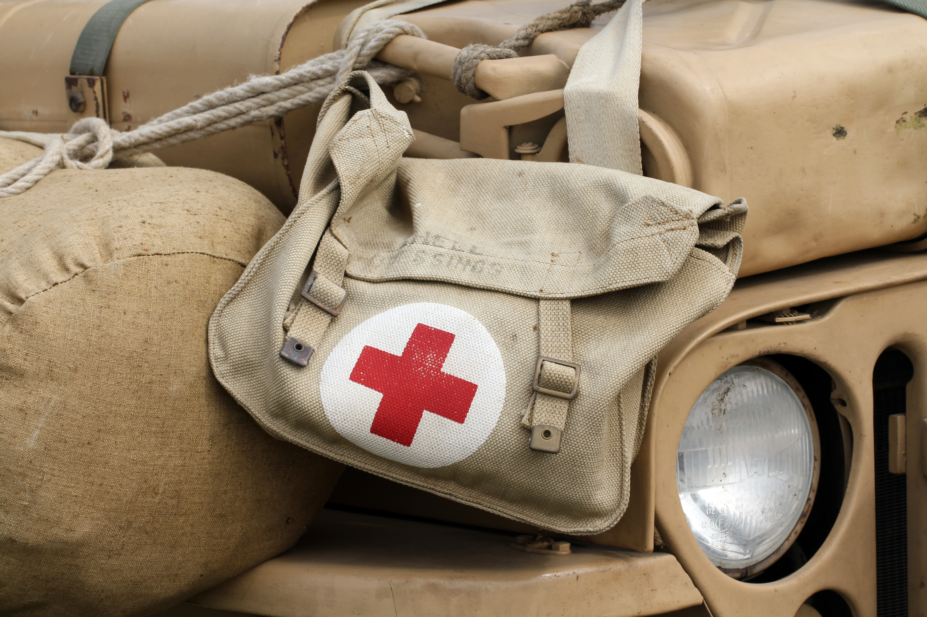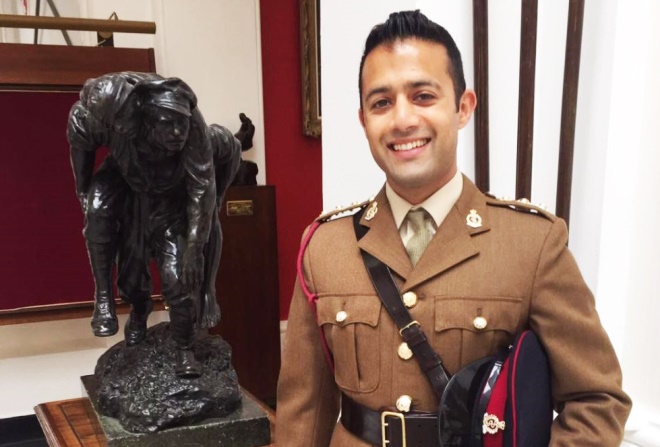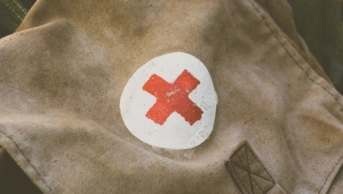
Shutterstock.com
Previously known as the Territorial Army, the Army Reserve is formed of people from all walks of life, who train and work professionally alongside their regular counterparts in their free time. Throughout its history, almost every major operation has seen reservists work alongside the regular Army, both at home and overseas. It provides pharmacists with an opportunity to experience something new and make a difference outside of their normal day job.
The Army Medical Services Reserve (AMS Res) forms part of the Army Reserve. It provides professionally qualified healthcare personnel with an opportunity to utilise their talents and develop new skills, enhancing their interpersonal and leadership abilities while gaining confidence and motivation.
There are exciting opportunities to be deployed abroad to support humanitarian operations — a unique supplement to a professional portfolio
The AMS Res works closely with services such as the NHS to encourage personnel to join. Extra time off to fulfil training requirements may also be offered depending on area. There are exciting opportunities to be deployed abroad to support humanitarian operations — a unique supplement to a professional portfolio.
Pharmacists may find suitable roles in either the nationally recruited units or regional units. Regional units are organised into either medical regiments or field hospitals. They often recruit from their local area as training is mainly conducted on weekday evenings, and some weekends. The training commitment is 27 days per year. You are welcome to visit a regional unit and talk with the team about the roles available or even join them for a few evenings to see if you are interested.
Nationally recruited units (NRUs) recruit people with specialist skills and experiences from across the UK. There are three NRUs: 306 Hospital Support Regiment, 335 Medical Evacuation Regiment and Medical Operational Support Group, all with their headquarters located in Strensall, York. The training commitment is 19 days per year and this is conducted nationally, usually over weekends. You are welcome to contact an NRU and talk with the team about the roles available, if they are interested.
Entry requirements
Pharmacists may choose to join the Army Reserve as a professionally qualified soldier or officer, with entry rank dependent on age and experience.
The age requirement to join is 18 years to 49 years 7 months for officers (to be in training by the age of 50 years) and 18–50 years for soldiers.
Further prerequisites are an accredited degree in pharmacy (MPharm, BPharm, BSc), and registration with the General Pharmaceutical Council.
If candidates are able to run 1.5 miles in under 14 minutes at the Army Reserve soldier assessment centre, they meet the British Army’s fitness standard
Pharmacists do not need to be overly athletically fit to join the Army Reserve, but a degree of fitness is required; the greater an individual’s physical ability, the easier they will find much of the training.
Physical fitness is geared around cardiovascular performance as well as strength. It is important to note that many of the physical training instructors will assist recruits with reaching their fitness goals. Like anything, what you put in is what you get back.
If candidates are able to run 1.5 miles (2.4 km) in under 14 minutes at the Army Reserve soldier assessment centre, they meet the British Army’s fitness standard. Candidates are required to carry a 20L water carrier (Jerry can) in each hand to a set pace with a different pass level for each trade. There is also a static lift that consists of lifting a holdall-shaped bag, starting at 15kg for a distance of 1.5m, increasing by 5kg increments up to 45kg. Allowances for age are made for some tasks.
Entry
There are various ways for pharmacists to join the AMS Res.
Joining as a soldier
After successfully passing the assessment centre stage, pharmacists joining as a professional soldier will begin Phase I (Alpha) training. This covers the basics of soldiering and is held at Strensall, York, or one of the other national Army training units. Phase I (Alpha) training is conducted over four weekends or as a consolidated course over seven days.
The next stage, Phase I (Bravo) training is held at an Army training unit and is a two-week course to be held within eight weeks of Alpha training. This two-week course expands on basic skills, introduces new ones and builds on individual fitness.
Phase II training is specific to an additional, non-pharmacy role selected by candidates and so would vary in length depending on what you choose. You may wish to become an Army Reserve infanteer, driver or chef to name some examples.
Joining as an officer
Pharmacists who wish to join the AMS Res as an officer must complete the Army Officer Selection Board (AOSB). This is conducted at Westbury, Wiltshire, and is a two-and-a-half day assessment where pharmacists, alongside other healthcare professionals, are given the opportunity to demonstrate the aptitude required to be an officer. Individuals are assessed on specific scenarios and on observed conduct between tasks, such as punctuality, attitude, resilience and bearing.
The AOSB involves assessment of general fitness and agility, intellect and presentation skills. Candidates will be required to write an essay and conduct a discussion around current affairs with their peers. A planning exercise will involve devising a solution to a conceptual problem and presenting this to the group.
Outside the classroom, candidates take turns to lead on a command task. This involves leading a team to achieve a desired objective. For example, ensuring a team of soldiers and kit is transported safely from one area to another using the kit to create a bridge across water. AOSB also includes completing an obstacle course within a given time limit. Individuals also undertake an interview with senior officers on the AOSB panel, mainly focused on why they want to join the AMS Res and their professional career prospects.
Joining as a Reserve potential officer
This is another way to join as a soldier, but with the potential to become an officer. Pharmacists complete Phase 1 Alpha and Bravo training and build on their confidence and skills to pass the AOSB and therefore follow the officer route. Their Phase 1 Alpha and Bravo training would count as their MOD Alpha (see ‘Officer training’ below) on a successful AOSB result.
Officer training
After passing the AOSB, the training to become a professionally qualified officer is more condensed than regular Army training, but is just as intense. The first part of training is MOD Alpha, a two-week course held at the prestigious Royal Military Academy Sandhurst. Trainee officers will form part of the unit and build on their existing soldier training, focusing on the fundamental skills required of a professionally qualified officer in the British Army.
Completion of MOD Alpha leads to MOD Bravo, which again is a two-week course held at the Royal Military Academy Sandhurst. This course focuses on leadership and comprises lectures and an outdoor exercise where trainees move through assigned roles within a Battalion. It is here where many of the basic skills, such as weapon handling, navigation, fitness, decision-making and leadership, are put to the test.
The intensity of work required in the last few days of training will push individuals to levels not previously encountered as a pharmacist. Trainees are required to perform physically and mentally with less sleep than they are used to. On successful completion of the course, individuals take part in a formal parade at the Royal Military Academy Sandhurst, which sees them commissioned into the Royal Army Medical Corps.
As trainees are already qualified pharmacists, the Phase II specific trade training is not required. Phase II further training courses include the Entry Officer’s Course, which leads on to further medical planning courses. These provide the knowledge required to work in a deployed hospital care environment and the command element that drives it. Pharmacists can also look into further specialities such as tropical medicine if they are interested.
Opportunities and pay
Rank on joining will vary, depending on professional qualifications and length of time since qualification (seniority).
Individuals are paid a daily rate (pro rata to attendance) according to rank. This includes being paid for attendance at weekly drill nights (a quarter of a day’s pay), weekends (two and a quarter day’s pay) and any courses including annual collective training (two week’s pay based on completing a two-week camp). If all annual training commitments are completed, individuals are entitled to a tax-free bonus, known as a ‘bounty’.
Being able to demonstrate military service carries value, as all these traits are highly sought after by prospective employers
Pharmacists can take advantage of opportunities outside of prescribed training, such as conducting medical training abroad with other nations or involvement in adventure training and learn a new skill, such as climbing or skiing. Individuals may even find themselves part of a unit team at a shooting competition, demonstrating their marksmanship skills at up to 600m.
Opportunities to deploy to somewhere around the world are also available. As well as dispensing and ward-based clinical services, pharmacist officers are the subject matter experts on medicines management and would be the first port of call to advise senior commanders on operations. This could be in a very remote location of the world, or in a resource-limited environment where new logistical challenges, such as temperature control, may arise. Pharmacists may be responsible for controlled drugs and their safe custody requirements, or be involved in teaching and training on medicines management to the multidisciplinary team. You may be asked to advise prescribers on the correct antivenom required for a patient presenting with a snake bite.
Rewards
The AMS Res will help strengthen a pharmacist’s career. The officer training at Sandhurst teaches individuals teamwork, communication and a strong work ethic. Being able to demonstrate military service carries value, as all these traits are highly sought after by prospective employers. The AMS Res will expose pharmacists to a diverse range of people, allowing for additional learning and growth and the opportunity to help others and make a difference in the world.
For more information about the AMS Res visit: https://www.army.mod.uk/who-we-are/corps-regiments-and-units/army-medical-services/.

Source: Anuj Sunder
About the author:
Anuj K Sunder is a pharmacist and major for the Royal Army Medical Corps and is part of the Medical Operational Support Group based in York. In 2018, he was deployed to South Sudan on a UN humanitarian mission. He currently works as a pharmacist for The Royal Wolverhampton NHS Trust.


